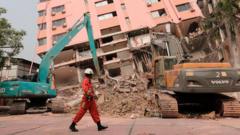Fighting has erupted in Myanmar even after the announcement of temporary ceasefires aimed at facilitating earthquake relief efforts, highlighting ongoing tensions in the region.
Continued Conflict in Myanmar Amid Ceasefires Following Earthquake

Continued Conflict in Myanmar Amid Ceasefires Following Earthquake
Despite announced ceasefires for earthquake relief, violence persists in Myanmar as military and rebel factions clash.
As of Friday, reports indicate that the military junta has conducted at least 14 attacks, despite a 20-day ceasefire declared on April 2nd in light of a devastating 7.7 magnitude earthquake that struck on March 28, claiming over 3,500 lives.
Amidst this period of turmoil, the military accused rebel groups of violating the ceasefire. In turn, one rebel faction responded by asserting that their actions were defensive responses to military offensives. Maj Gen Zaw Min Tun, spokesperson for the military council, stated that they would retaliate if military bases face unwarranted attacks. Notably, the military has not yet responded to inquiries for further clarification.
UN Human Rights Commissioner Volker Türk has called for an end to military operations, urging the junta to prioritize humanitarian assistance to those impacted by the earthquake, noting the high casualty figures and the profound need for support.
In the aftermath of the quake, which injured over 5,000 individuals and left many missing, aid groups are struggling to deliver essential supplies due to military-imposed restrictions. Rescue operations continue in the earthquake-hit city of Mandalay, where recent rain has complicated efforts, while local residents face significant hardships in securing food, water, and shelter.
UN humanitarian chief Tom Fletcher highlighted the compounding crisis faced by nearly 20 million people in need, exacerbated by ongoing conflict and now the earthquake’s devastation.
As aftershocks persist, the situation remains dire, with many residents living in fear and uncertainty, demanding immediate assistance as their struggles multiply amidst the ongoing conflict.
Amidst this period of turmoil, the military accused rebel groups of violating the ceasefire. In turn, one rebel faction responded by asserting that their actions were defensive responses to military offensives. Maj Gen Zaw Min Tun, spokesperson for the military council, stated that they would retaliate if military bases face unwarranted attacks. Notably, the military has not yet responded to inquiries for further clarification.
UN Human Rights Commissioner Volker Türk has called for an end to military operations, urging the junta to prioritize humanitarian assistance to those impacted by the earthquake, noting the high casualty figures and the profound need for support.
In the aftermath of the quake, which injured over 5,000 individuals and left many missing, aid groups are struggling to deliver essential supplies due to military-imposed restrictions. Rescue operations continue in the earthquake-hit city of Mandalay, where recent rain has complicated efforts, while local residents face significant hardships in securing food, water, and shelter.
UN humanitarian chief Tom Fletcher highlighted the compounding crisis faced by nearly 20 million people in need, exacerbated by ongoing conflict and now the earthquake’s devastation.
As aftershocks persist, the situation remains dire, with many residents living in fear and uncertainty, demanding immediate assistance as their struggles multiply amidst the ongoing conflict.


















